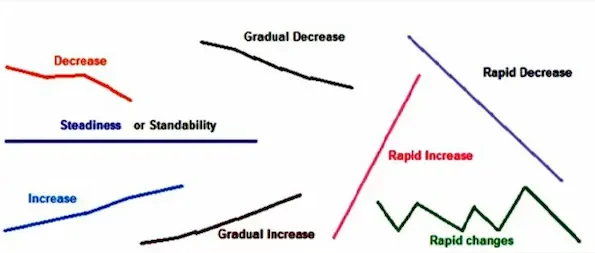To describe an IELTS writing task 1 line graph well and earn a high band score, you’ll need the following IELTS Line Graph Vocabulary, to show the examiner a variety of words to demonstrate upward and downward trends, as well as significant elements.
IELTS line graphs depict change through time, and when writing your report, you must use a variety of language and words.
Let’s build some vocabulary. Here is a list of verbs, adverbs, adjectives and nouns that you need to use to describe the IELTS Line Graph.
Verbs & Nouns
The verbs and nouns that can be used to describe a line graph in IELTS writing task 1 are listed below.

Upward trend
- rise / a rise
- increase / an increase
- climb / a climb
- grow / a growth
- go up
- Jump
- Rocket
Downward trend
- decrease / a decrease
- drop / a drop
- fall / a fall
- decline / a decline
- Go down
- Plummet
- Plunge.
Note that “plunge” and “plummet” do not take adverbs because what they
mean is a big decrease.
We can say “decreased considerably/sharply/dramatically/significantly/substantially” or “plunged”,
or “plummeted”.
But, we must not say,
“plummeted considerably/sharply/dramatically/significantly/substantially”
or
“plunged considerably/sharply/dramatically/significantly/substantially”
No need to use those two verbs “plunge” and “plummet” with an adverb. Decreased sharply equals plummeted. They mean the same thing.
Likewise, “rocket” does not take adverbs. So to as y increased significantly, rose sharply, they mean the same thing as rocket. A big/sharp increase, so no adverbs for rocket.
Other vocabulary
- fluctuate / a fluctuation
- dip / a dip
- remain steady
- remain stable
- remain unchanged
- level off
- peak at
- reach a peak of
- hit a high of
- hit a low of
- bottom out
- plateau
Mistakes when using words will affect your band score. This includes spelling.
- Band 6 = some vocabulary errors.
- Band 7 = few vocabulary errors.
Practice Exercise Adverbs & Adjectives Time Phrases Useful link to model answers and more tips for line graphs
Line Graph Adverbs & Adjectives
The adverbs and adjectives listed below can be used to describe the change.
Adverbs: steadily, gradually, sharply, rapidly, steeply, slightly, dramatically, significantly, considerably.
There are some things I need you to be aware of here. I want you to know that steadily and gradually mean the same thing.
Slightly is something means different. Steadily and gradually mean over a period of time. Slightly means how much deals with amount. Steadily and gradually mean a gradual change like a child growth; he or she grows gradually/ he or she grows over time.
Adjectives: steady, gradual, sharp, rapid, steep, slight, dramatic, significant, considerable
Sentences:
- The number of cases of influenza increased steadily from 40 to 55 in the first three years.
- There was a steady rise in the number of cases of influenza to reach 55 in 1987 from 40 in the first year.
Time Expressions
Line graphs in the IELTS indicate change over time. Here are a few idioms to help you describe the passage of time without using too many words.
Time phrases:
- over the next three days
- three days later
- in the following three days
- the next three days show
- over the period
- from…to… / between … and…
- the last year
- the final year
- the first year
- at the beginning of the period
- at the end of the period
